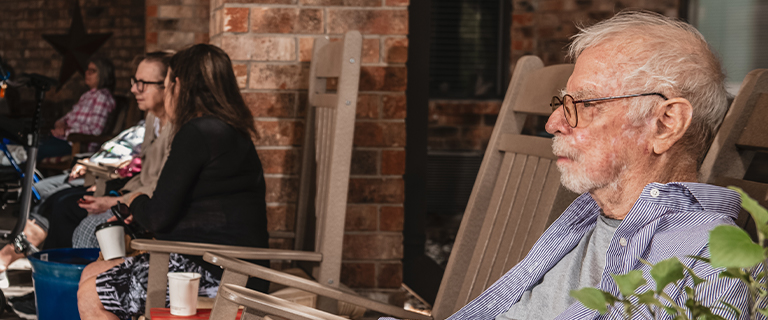As our loved ones age, it’s important to pay close attention to their well-being and know the signs that something may be wrong. Age is closely associated with many different cognitive, emotional, and physical changes, and there may be a point where they need a more advanced level of care—like the services offered in assisted living.
It’s essential to watch out for signs of change in your loved ones, like a sudden weight change, memory problems, or even self-isolation or emotional troubles. By monitoring sudden changes in their mental, physical, and emotional states, you can help detect potentially developing problems early and get your loved one the help they need.
Common Physical Changes in Seniors
As seniors grow older, it’s common to develop some physical changes that may be an indicator of a decline in their overall health. These can often be early warning signs that something more serious is wrong, indicating the potential need for a more advanced level of care.
Weight Changes
It’s important to keep an eye on any sudden changes in your loved one’s weight, as sudden and significant weight changes can often be a sign of something wrong. This could be caused by several things, including:
- Malnutrition
- Medical conditions like diabetes
- Dehydration
- Side effects from medication
Changes in Personal Hygiene
A sudden change to a senior’s personal hygiene is another thing to pay close attention to. If you notice there’s been a change to their personal grooming habits, or they begin wearing dirty clothes more often than not, it could be an indication of physical or cognitive decline. This could be a sign that they’re experiencing difficulties in performing their daily tasks needed for self-care.
Decreased Mobility & Balance
A notable decline in mobility and balance can be an indicator that something is amiss, and this can often lead to a significant impact on a senior’s well-being and safety. If you notice your loved one is experiencing one or more of the following, it may be time to consider professional care:
- Difficulty walking
- Balance problems
- Falling more often
- Difficulty switching from standing to sitting
These changes could be caused by muscular problems, joint weakness, or even certain neurological conditions. If your loved one is experiencing difficulty with their balance or mobility, you should speak with their healthcare provider to determine if there may be something wrong.
Common Cognitive Problems in Seniors
Cognitive decline is commonly experienced as part of the aging process, but there are some signs to watch out for that may indicate a need for professional assistance or medical help.
Memory Problems
Frequent forgetfulness, especially for short-term memories, can be an early sign of cognitive decline. Memory loss that begins disrupting a person’s ability to function independently should be acknowledged as a serious change. It’s important to watch out for the early signs of memory problems or memory impairment, like:
- Forgetting important dates
- Missing appointments
- Reliance on memory aids or tools for remembering things
- Repeating sentences in a conversation
- Forgetting names or faces
Disorientation & Confusion
Seniors experiencing confusion and disorientation may be suffering from cognitive problems like memory impairment. These conditions often show very few symptoms in their earlier stages but begin to affect a person more severely as they progress further. By knowing the early signs of conditions like Alzheimer’s or dementia, you can get treatment for your loved one sooner rather than later.
Communication Problems
A common problem closely linked to cognitive decline is the development of communication or language problems. When memory impairment begins affecting a person, they may have trouble communicating, which can manifest as:
- Using words incorrectly
- Forgetting what a conversation is about
- Repeating sentences
- Being unable to articulate their thoughts
- Frequently pausing in speech
These can lead to feelings of frustration or even isolation as communicating with the people around them becomes more difficult. It is possible for this to affect a person’s mental health, and may contribute to depression or anxiety. If you notice your loved one has begun developing issues with communication, you should seek help from a healthcare professional.
Emotional Changes in Seniors
A variety of emotions can arise in seniors as they navigate their golden years. If your loved one has begun developing significant emotional changes, it’s important to take note of this and seek professional help for them if necessary.
Loss & Grief
Many seniors experience the loss of parts of their life as they age. Whether this is the loss of a loved one, their loss of independence, or a reduced ability to participate in things they once enjoyed, grief can affect all aspects of a person’s life. This can lead to:
- Feeling sad or down more often
- Depression
- Anxiety
- Social withdrawal
It’s important to seek help for your loved one if you believe they need support for grief. Whether they live at home, with you, or in a senior living community, there are support options available to help your loved one.
Health Issues
Seniors may experience many health issues as they age. Chronic pain, new medical conditions, or the progression of existing issues can make a significant impact on a person’s overall well-being. It can be difficult to cope with physical pain and the psychological effects of many medical conditions. It’s essential to monitor your loved one’s medical conditions so you can seek help from a healthcare professional if necessary.
Social Isolation
Seniors who become isolated in their later years are at a higher risk of experiencing emotional problems or a decline in their mental health. Socialization and connection play an important role in a person’s overall well-being, so it’s important to take proactive steps to help your loved one socialize and bond with others.
Whether this is done by addressing limitations they may face, like mobility problems or a lack of access to activities around them, there are several ways you can promote socialization to help your loved one feel connected to the people in their life.
Some strategies you can try include:
- Using technology like cell phones and video calls
- Seeking activities in the area they may have an interest in
- Scheduling regular visits with their friends or loved ones
If they live in assisted living, you can always see what programs and amenities are available for social opportunities!
Supporting a Senior Loved One
It’s important to monitor your loved one’s health as they age. There are many problems that can develop in their senior years, so knowing the signs of physical, mental, and emotional decline gives you the chance to address problems earlier and give your loved one the support they need.
At Parsons House Austin, we know how important it is to give your loved one proper care and support. Our teams on-site are trained to recognize the signs of physical, emotional, and cognitive decline, and we’re here to help. Book a tour with us today to offer your loved one the care they deserve.



